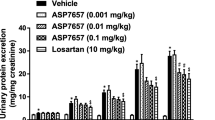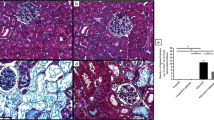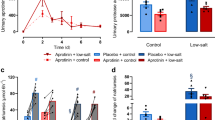Summary
In rats the effect of prostaglandin synthetase inhibition on the enhanced protein degradation in acute uremia was investigated. After 48 h of bilateral nephrectomy the urea nitrogen appearance, an indicator of net protein degradation, was calculated, andN τ-methylhistidine (N τ-MH) serum concentration was measured for judging myofibrillar breakdown. Also serum urea nitrogen, creatinine, and potassium serum concentrations were followed up. All bilateral nephrectomized rats showed severe uremic disturbances with increased (P < 0.01) concentrations of serum urea nitrogen, creatinine, and potassium. Moreover, the urea nitrogen appearance andN τ-MH serum concentration increased (P < 0.05) significantly. Administration of indomethacin (4 mg · kg−1 b.wt./12 h i.p.) in bilateral nephrectomized rats did not influence the analyzed parameters significantly. Thus, we could not demonstrate a positive influence on the increased skeletal muscle degradation in acutely uremic rats by prostaglandin synthetase inhibition. These data suggest that in our model of acute uremia prostaglandins do not play a major role in the degradation of striated muscle.
Similar content being viewed by others
References
Baracos V, Rodemann HP, Dinarello CA, Goldberg AL (1983) Stimulation of muscle protein degradation and prostaglandin E2 release by leukocytic pyrogen (interleukin-1). N Engl J Med 308:553–558
Butler RR, Jr, Wise WC, Haluska PV, Cook JA (1983) Gentamicin and indomethacin in the treatment of septic shock effects on prostacyclin and thromboxane A2 production. J Pharmacol Exp Ther 225:94–101
Flügel-Link RM, Salusky JB, Jones MR, Kopple JD (1983) Protein and amino acid metabolism in posterior hemicorpus of acutely uremic rats. Am J Physiol 244 (Endocrinol Metab 7):E 615-E 623
Haverberg L, Deckelbaum L, Bilmazes C, Munro H, Young V (1975) Myofibrillar protein turnover and urinary Nτ methylhistidine output. Biochem J 152:503–510
Heidland A, Hörl WH (1984) Contribution of proteases to hypercatabolism in acute renal failure. In: Robinson RR (ed) Nephrology. Springer, Berlin Heidelberg New York, pp 763–775
Hillgartner FB, Morin D, Hansen RJ (1982) Effect of excessive vitamine A intake on muscle protein turnover in the rat. Biochem J 202:499–508
Hörl WH, Stepinski J, Gantert C, Hörl M, Heidland A (1981) Evidence for the participation of proteases on protein catabolism during hypercatabolic renal failure. Klin Wochenschr 59:751–759
Huang YS, Falardeau P, Martineau A, Nestruck AC, Davignon J (1986) Effect of indomethacin treatment on prostaglandin excretion and tissue phospholipid fatty acid composition in rats bearing mammotropic pituitary tumor, MtF-F4. Prostaglandins Leukotrienes Med 23:249–252
Kopple JD (1981) Nutritional therapy in kidney failure. Nutr Rev 39:193–206
Laidlaw SA, Zipser R, Tasaki T, Wu SHW, Kopple ID (1985) Inhibition of prostaglandin E2 (PGE2) release by indomethacin (IND) does not decrease muscle protein degradation in acutely uremic rats. Kidney Int 27:233
Li J, Wassner S (1986) Protein synthesis and degradation in skeletal muscle of chronically uremic rats. Kidney Int 29:1136–1143
Millward DJ, Bates PC (1983) 3-Methylhistidine turnover in the whole body, and the contribution of skeletal muscle and intestine to urinary 3-methylhistidine excretion in the adult rat. Biochem J 214:607–615
Rennie MJ, Millward DJ (1983) 3-Methylhistidine excretion and the urinary 3-methylhistidine/creatinine ratio are poor indicators of skeletal muscle protein breakdown. Clin Sci 65:217–225
Rodemann HP, Waxman L, Goldberg AL (1982) The stimulation of protein degradation in muscle by Ca2+ is mediated by prostaglandin E2 and does not require the calcium-activated protease. J Biol Chem 257:8716–8723
Rodemann HP, Goldberg AL (1982) Arachidonic acid, prostaglandin E2 and F2 influence rates of protein turnover in skeletal and cardiac muscle. J Biol Chem 257:1632–1638
Schaefer RM, Weipert J, Moser M, Peter G, Heidbreder E, Hoerl WH, Heidland A (1988) Reduction of urea generation and muscle protein degradation by adrenalectomy in acutely uremic rats. Nephron 48:149–153
Teschner M, Heidland A (1985) Nutrition in acute renal failure. Blood Purif 3:170–178
Young VR, Alexis SD, Baliga BS, Munro H, Muecke W (1972) Metabolism of administered 3-methylhistidine, lack of muscle transfer ribonucleic acid charging and quantitative excretion as 3-methylhistidine and its N-acetyl derivate. J Biol Chem 247:3592–3600
Author information
Authors and Affiliations
Rights and permissions
About this article
Cite this article
Weipert, J., Peter, G. & Heidland, A. Prostaglandin synthetase inhibitors are not beneficial in the hypercatabolic state of acute uremia in rats. Res. Exp. Med. 188, 183–187 (1988). https://doi.org/10.1007/BF01852319
Received:
Accepted:
Issue Date:
DOI: https://doi.org/10.1007/BF01852319




